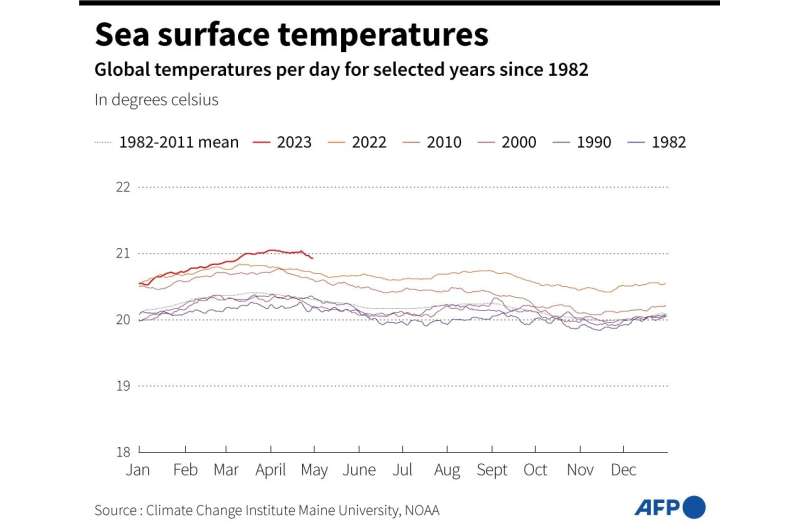This article has been reviewed according to Science X's editorial process and policies. Editors have highlighted the following attributes while ensuring the content's credibility:
fact-checked
reputable news agency
proofread
Record sea surface heat sparks fears of warming surge

With sea surface temperatures swelling to new highs in recent weeks, scientists warn that humanity's carbon pollution has the potential to turn oceans into a global warming "time bomb".
Oceans absorb most of the heat caused by planet-warming gases, causing heatwaves that harm aquatic life, altering weather patterns and disrupting crucial planet-regulating systems.
While sea surface temperatures normally recede relatively quickly from annual peaks, this year they stayed high, with scientists warning that this underscores an underappreciated but grave impact of climate change.
"The ocean, like a sponge, absorbs more than 90 percent of the increase in heat caused by human activities," said leading oceanologist Jean-Baptiste Sallee, of the French research agency CNRS.
Year by year ocean warming is increasing at "an absolutely staggering rate", he told AFP.
In early April, the average surface temperature of the oceans, excluding polar waters, reached 21.1 degrees Celsius, beating the annual record of 21C set in March 2016, according to data from the United States NOAA observatory that goes back to 1982.
Although temperatures began to drop at the end of the month, they have remained above seasonal records for the past six weeks, with fears that the looming warming El Nino weather phenomenon could load even more heat into the climate system.
The most immediate consequence of the surge in ocean temperatures is more marine heatwaves, which he said "act like underwater fires" with the potential to irreversibly degrade thousands of square kilometers of underwater forest—for example of kelp or corals.
Higher sea surface temperatures disrupt the mixing of nutrients and oxygen that are key to supporting life and potentially alter the ocean's crucial role in absorbing carbon from the atmosphere.

"As the water is warmer, there will be increased evaporation and a high risk of more intense cyclones, and perhaps consequences on ocean currents," said oceanologist Catherine Jeandel, of CNRS.
Temperatures are also rising throughout the water column and all that heat does not disappear.
Scientists expect that excess heat stored in the world's waters will eventually be returned to the Earth system and contribute to more global warming.
"As we heat it up, the ocean becomes a bit like a time bomb," said Jeandel.
El Nino
The recent record might be explained by the end of the temporary atmospheric phenomenon known as La Nina—which tends to have a cooling effect—and the expected arrival of its warming opposite, El Nino.
"During El Nino years, the deep ocean releases heat to the surface and warms the atmosphere," said Sallee, one of the authors on the landmark UN reports on climate change.
But scientists have cautioned that the real concern is the temperature rise over decades—and beyond.
When you take into account the background rise in sea surface temperatures, "2023 doesn't look too out of place relative to other El Nino years," climate scientist David Ho, a professor at the University of Hawaii at Manoa, said on Twitter.
"It's the long-term sea surface temperature trend that should alarm us," he added.

Heating the deep
In January, an international group of researchers said heat content in the upper oceans in 2022 exceeded the previous year's levels by around 10 Zetta joules—equivalent to 100 times the electricity generation worldwide in 2021.
Records going back to the late 1950s show a relentless rise in surface temperatures with almost continuous increases going back to around 1985.
While the sea's surface responds relatively quickly to global warming, the deep ocean "typically adjusts over centuries to millennia", said Karina Von Schuckmann, a researcher specialized in ocean monitoring at Mercator Ocean.
Just like the sea level rise that will play out over hundreds of years as a result of today's carbon emissions, she said ocean heat content will "continue to increase long after surface temperature stabilizes".
"In other words, projections suggest that historic ocean warming is irreversible this century", with the ultimate net warming dependent on our emissions.
For Frederic Hourdin, research director at the CNRS Dynamic Meteorology Laboratory, the latest surface temperature should raise awareness of the bigger climate change picture.
Clearly, he said, we are still "not sufficiently aware that the objective is to do without oil and coal".
© 2023 AFP





















